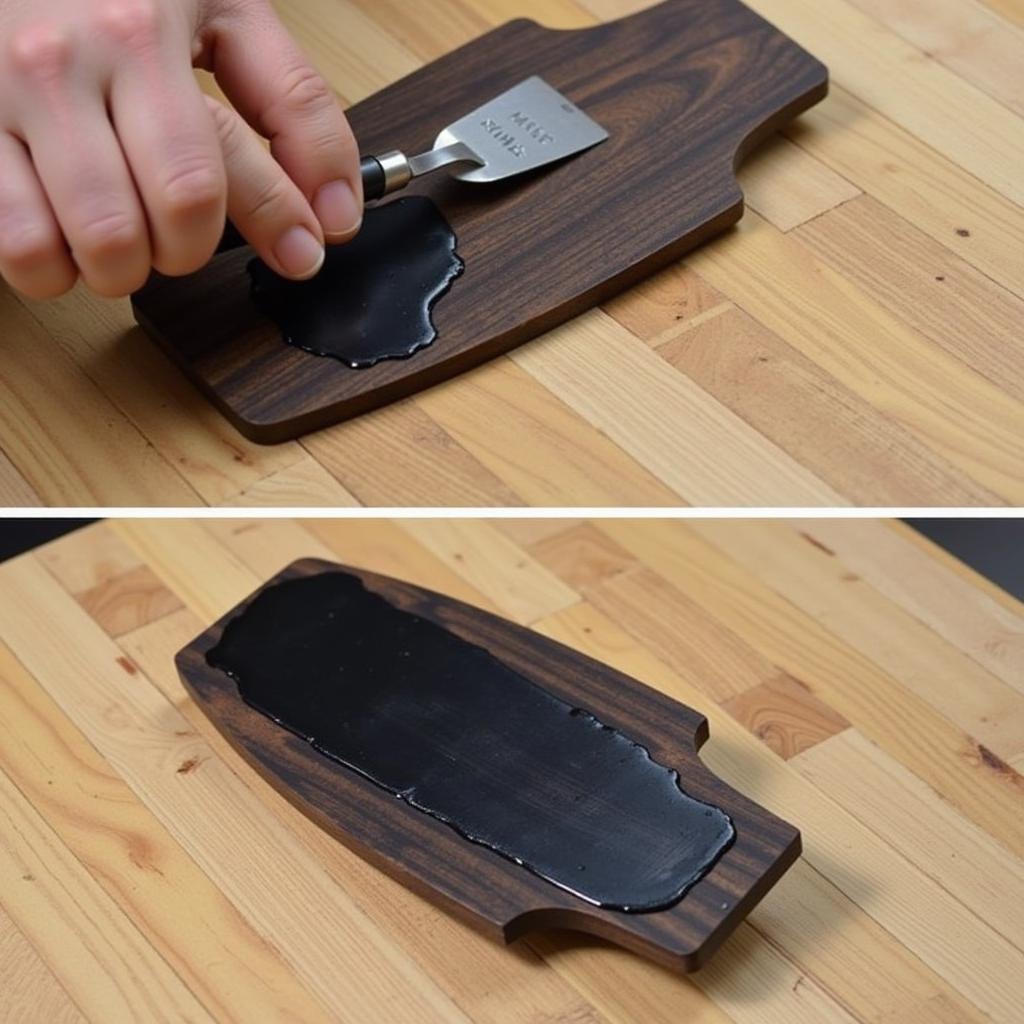Ebonized wood, with its rich, dark allure, has become a popular choice for various decorative items, including kitchenware. But Is Ebonized Wood Food Safe? This is a crucial question for anyone considering adding ebonized wood items to their culinary collection. Let’s explore the facts and address common concerns surrounding the safety of using ebonized wood with food.
Understanding Ebonization and Its Implications for Food Safety
Ebonizing wood is a process that involves darkening the wood’s natural color to resemble ebony. There are several methods to achieve this, ranging from traditional stains and dyes to modern chemical treatments. Understanding the specific method used is key to determining the food safety of the final product. Some traditional methods, like using iron acetate or vinegar and steel wool, can be relatively safe when properly sealed. However, certain modern chemical treatments may pose potential risks if they leach into food.
Traditional Ebonizing Methods and Food Safety
Iron Acetate: A Historical Approach
Historically, iron acetate was a common ebonizing agent. When applied to wood containing tannins, it reacts to create a deep black color.  Iron Acetate Ebonizing Process While generally considered safe once cured and sealed, ensuring the wood is thoroughly sealed is essential to prevent any potential leaching of iron acetate into food.
Iron Acetate Ebonizing Process While generally considered safe once cured and sealed, ensuring the wood is thoroughly sealed is essential to prevent any potential leaching of iron acetate into food.
Vinegar and Steel Wool: A DIY Approach
Another traditional method involves soaking steel wool in vinegar to create a solution that reacts with tannins in the wood. This process creates a black stain similar to iron acetate. The food safety of this method also relies heavily on proper sealing.
Modern Ebonizing Methods and Potential Risks
While traditional methods can be relatively safe, modern chemical stains and dyes raise concerns. Some of these chemicals may contain harmful substances that could leach into food. Therefore, it’s crucial to verify the food safety of any modern ebonizing product before using it for kitchenware. Opt for products explicitly labeled as food-safe.
Is Ebonized Wood Food Safe for Cutting Boards?
Cutting boards require direct contact with food, making the safety of ebonized wood even more critical in this application. Generally, ebonized wood is not recommended for cutting boards. The porous nature of wood, even when sealed, can harbor bacteria, and the ebonizing process may further complicate cleaning and sanitation.
Is Ebonized Wood Food Safe for Serving Utensils?
Serving utensils have less prolonged contact with food than cutting boards. However, choosing food-safe ebonized wood is still crucial. Ensure the finish is durable and non-toxic. Avoid using ebonized wood utensils for acidic or hot foods, as these can compromise the finish and potentially leach chemicals.
Expert Insights on Ebonized Wood and Food Safety
“When it comes to food safety, it’s always best to err on the side of caution,” says Dr. Amelia Hardwood, a renowned food scientist. “While some traditional ebonizing methods can be safe with proper sealing, modern chemical treatments should be approached with care.”
Another expert, Chef Oliver Woodcraft, adds, “For kitchenware, prioritizing materials explicitly labeled as food-safe is paramount. This ensures the health and well-being of those enjoying your culinary creations.”
Conclusion
Is ebonized wood food safe? The answer depends largely on the ebonizing method and intended use. While some traditional methods can be safe when properly sealed, modern chemical treatments require careful consideration. For direct food contact, like cutting boards, it’s generally best to avoid ebonized wood. When choosing ebonized wood for serving utensils or other kitchenware, prioritize food-safe products and follow best practices for cleaning and maintenance. By understanding the nuances of ebonization and prioritizing safety, you can confidently incorporate the beauty of ebonized wood into your culinary space.
FAQ
- What is ebonized wood?
- How is wood ebonized?
- Are all ebonizing methods food safe?
- Can I use ebonized wood for a cutting board?
- What precautions should I take when using ebonized wood kitchenware?
- How do I clean ebonized wood?
- Where can I find food-safe ebonized wood products?
Need further assistance? Contact us! Phone: 02437655121, Email: minacones@gmail.com Or visit us at: 3PGH+8R9, ĐT70A, thôn Trung, Bắc Từ Liêm, Hà Nội, Việt Nam. We have a 24/7 customer service team.